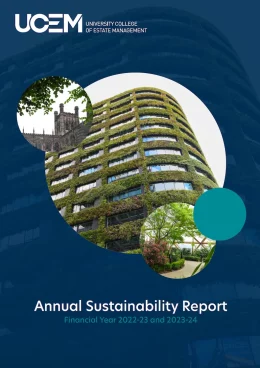 Download
Download
UCEM Sustainability Annual Report
Financial Year 2022-23 and 2023-24
Our ambition is for sustainability to become synonymous with who we are and for UCEM to be regarded as a true global leader.
This year has seen the successful accreditation and launch of new sustainability-focused programmes such as the MSc Innovation in Sustainable Built Environments, as well as new professional training materials needed to upskill built environment professionals. UCEM’s focus on excellent sustainability education has been recognised via the King’s Foundation Partnership of the Year award, demonstrating how the institution has gone “above and beyond” in our research and provision of educational resources.
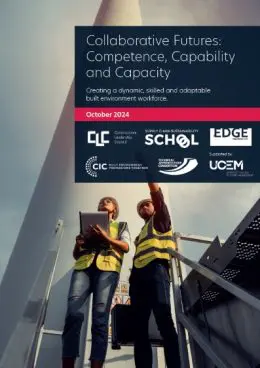 Download
Download
Collaborative Futures: Competence, Capability and Capacity
The ‘Collaborative Futures: Competence, Capability & Capacity’ report captures the key discussions and insights from UCEM’s similarly titled ‘INSPIRE’ event, which convened leaders, educators and workforce experts from across the built environment.
The report explores the cooperative efforts required to address the sector’s current skills challenges, including workforce skills gaps, competence standards and utilising new technologies.
Serving as a roadmap for building a skilled, resilient and adaptable workforce, it highlights strategic priorities such as fostering cross-sector coordination, creating inclusive talent pathways and enhancing professional & technical qualifications. It also examines the role of digitalisation and AI in upskilling the workforce and promoting sustainable practices.
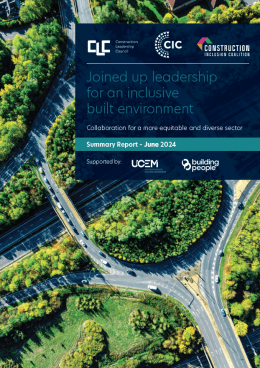 Download
Download
Joined up leadership for an inclusive built environment: Collaboration for a more equitable and diverse sector
‘Joined Up Leadership for an Inclusive Built Environment’ encapsulates the insights and collaborative efforts needed to foster equity, diversity and inclusion within the built environment. It draws on the collective wisdom of experts across construction, real estate and related sectors, who convened at a UCEM-hosted event to tackle the pressing challenges of attracting, retaining and nurturing diverse talent.
Highlighting key initiatives, such as the impactful collaboration of professional bodies and strategic recommendations for sector-wide improvement, the report underscores the importance of unified action and leadership. It aims to guide the built environment towards a more inclusive future, emphasising collaborative action and shared commitment as catalysts for lasting change.
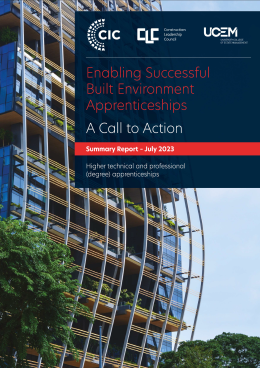 Download
Download
Enabling Successful Built Environment Apprenticeships: A Call to Action
‘Enabling Successful Built Environment Apprenticeships: A Call to Action’, published by UCEM in partnership with the Construction Industry Council and the Construction Leadership Council recommends reforms to increase the retention, continuation and success of built environment apprenticeships, especially at higher technical and professional levels.
Apprenticeships have emerged as a key avenue for bringing people into technical and professional roles in the built environment. However, the report identifies some barriers to these types of apprenticeships which need to be overcome if we are to prepare the built environment professionals of tomorrow with the competencies that will deliver enhanced building safety standards, net-zero, sustainability and digital transformation.
The report also highlights how sectoral collaboration and partnerships are critical to attracting and retaining the right people in construction and the built environment, via the right apprenticeships, the right training providers and end point assessment processes, at the right time.
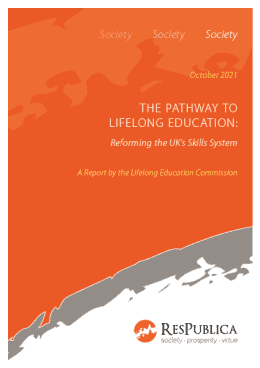 Download
Download
The Pathway to Lifelong Education: Reforming the UK’s Skills System
October 2021
This research report by public policy thinktank, ResPublica’s Lifelong Education Commission assesses the barriers to lifelong learning in England.
Chaired by former universities minister, Chris Skidmore MP, the hope is that the report will prompt the government to make changes to existing mechanisms to allow lifelong learning to flourish.
UCEM Principal, Ashley Wheaton, contributed his expertise to the report.
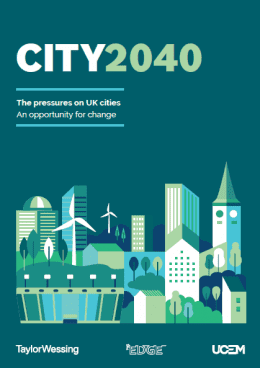 Download
Download
City 2040. The pressures on UK cities: An opportunity for change
July 2021
City 2040 proposes how UK cities need to change post-pandemic enabling the real estate industry to flourish over the next 20 years, and use these changes to benefit both the environment and the wellbeing of people.
Key elements of this vision include adapting single city centres to broaden their appeal, and the addition of smaller hubs within a city’s bounds. This will create more localised areas with unique identities and more widely accessible urban green space, all of which will benefit the environment.
The research, released by international law firm, Taylor Wessing, together with think tank, the Edge, and UCEM, harnesses ideas offered by 600 academics and experts drawing conclusions and new solutions for industry professionals to consider.
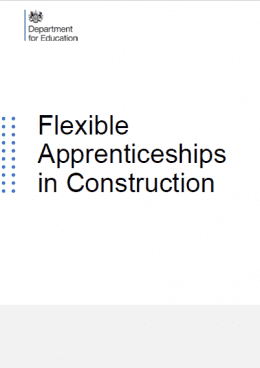 Download
Download
Flexible Apprenticeships in Construction
This manual, co-authored by industry and government, sets out how flexibilities in apprenticeships can be used and delivered in construction – to meet the needs of employers and apprentices.
Apprenticeships have been on a transformational journey since 2012, with reforms such as the introduction of employer-led standards leading the way in ensuring apprenticeships are relevant, high quality, and meet the skills needs of employers.
In 2020, the Prime Minister committed to building on this success, and making apprenticeships more flexible, to better meet the needs of employers and apprentices.
The manual sets out how the delivery of apprenticeship training can be flexed to meet employer needs and how the length of an apprenticeship can be reduced where an individual has existing relevant knowledge or skills.
 Download
Download
Build back better: Improving the apprenticeship system to better support infrastructure
October 2020
High skill, high tech construction apprenticeships are needed to boost the skills needed in infrastructure projects to drive the UK’s economic recovery. This is what is being called for by the authors of a new research report entitled ‘Build back better: Improving the apprenticeship system to better support infrastructure’.
The report, written on behalf of the Construction Industry Council (CIC), University College of Estate Management (UCEM) and the Technical Apprenticeship Consortium (TAC), with data used from a CIC survey of employers, recommends that Government works with CIC, employers and the professional bodies to: recognise the value of technical and higher-level apprenticeships leading to professional registration; increase the flexibility of the apprenticeship levy; join up and improve the apprenticeship systems across the UK; and celebrate and promote apprenticeships.
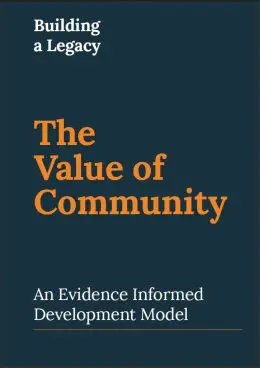 Download
Download
Value of Community: Building a Legacy
September 2019
Published by University College of Estate Management (UCEM) in partnership with The Prince’s Foundation, this report reveals a direct link between housing type and social benefits – so-called ‘social capital’. The team at UCEM surveyed 850 residents at Poundbury and Fairford Leys to give a fascinating snap-shot into the benefits of living, working and growing up in this particular type of housing development. Savills also produced a financial study to go alongside the report that reveals the long-term economic benefits of taking a sustainable approach to house building. A short version of the main report with separate appendices is available.
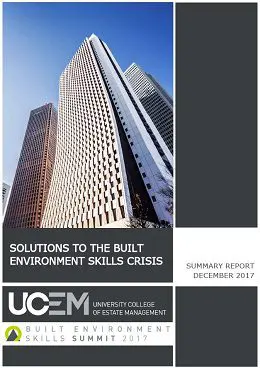 Download
Download
Solutions to the Built Environment Skills Crisis
January 2018
It is becoming ever more apparent that the current levels of training and education for all disciplines associated with the Built Environment in the United Kingdom are not adequate to meet the growing needs of industry, either now or in the future. Supply is both insufficient and inadequate, largely due to the fragmentation which exists across the supply chain. The challenges for education providers, competing in a market where certainty, policy, regulation and funding are all subject to frequent and cyclical changes, results in decisions being taken which are not always in the best interests of enabling industry.
 Download
Download
Open Badges: A Systematic Review of Peer-Reviewed Published Literature (2011-2015)
September 2017
Open badges are a digital representation of skills or accomplishments recorded in a visual symbol that is embedded with verifiable data and evidence. They are created following a defined open standard, so that they can be shared online. Open badges have gained popularity around the world in recent years and have become a standard feature of many learning management systems. This paper presents a systematic literature review of the published open badges literature from 2011 to 2015.


